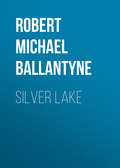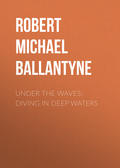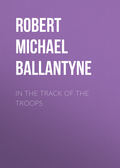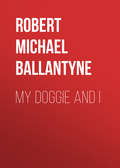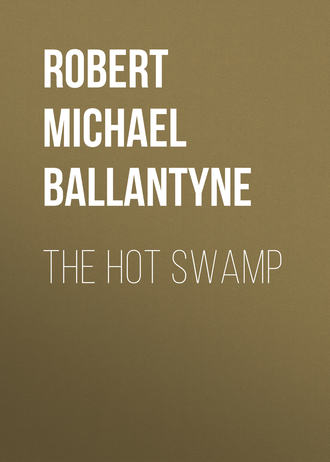
Robert Michael Ballantyne
The Hot Swamp
Chapter Thirty
Small Beginnings of Future Great Things
There was one thing, however, which threw a cloud over the rejoicing with which the conquerors hailed this memorable victory.
Gunrig’s wound turned out to be a very severe one—much more so than had been at first supposed—for the arrow had penetrated one of his lungs, and, breaking off, had left the head in it.
As Bladud was the only one of the host who possessed any knowledge of how to treat complicated wounds, he was “called in,” much against the wish of the wounded man; but when the prince had seen and spoken to him, in his peculiarly soft voice, and with his gentle manner, besides affording him considerable relief, the chief became reconciled to his new doctor.
“I thought you a savage monster,” said the invalid, on the occasion of the amateur doctor’s third visit; “but I find you to be almost as tender as a woman. Yet your hand was heavy enough when it felled me at the games!”
“Let not your mind dwell on that, Gunrig; and, truth to tell, if it had not been for that lucky—or, if you choose, unlucky—blow, I might have found you more than my match.”
The chief held out his hand, which the doctor grasped.
“I thought to kill you, Bladud; but when I get well, we shall be friends.”
Poor Gunrig, however, did not from that day show much evidence of getting well. His case was far beyond the skill of his amateur doctor. It was, therefore, resolved, a day or two later, to send him home under an escort led by Beniah.
“I will follow you ere long,” said Gadarn, as he grasped the hand of the invalid at parting, “for I have business at the court of King Hudibras.”
Gunrig raised himself in the litter in which he was borne by four men, and looked the northern chief earnestly in the face.
“You have not yet found your daughter?” he asked.
“Well—no. At least not exactly.”
“Not exactly!” repeated Gunrig in surprise.
“No; not exactly. That’s all I can say at present. All ready in front there? Move on! My greetings to the king, and say I shall see him soon. What, ho! Konar, come hither! Know you where I can find Prince Bladud?”
“In his booth,” replied the hunter.
“Send him to me. I would have speech with him.”
When the prince entered the booth of the commander-in-chief, he found that worthy with his hands on his sides, a tear or two in his eyes, and very red in the face. He frowned suddenly, however, and became very grave on observing Bladud.
“I sent for you,” he said, “to let you know my intended movements, and to ask what you mean to do. To-morrow I shall start for your father’s town with all my men.”
“What! and leave your daughter undiscovered?”
“Ay. Of what use is it to search any longer? There is not a hole or corner of the land that we have not ransacked. I am certain that she is not here, wherever she may be; so I must go and seek elsewhere. Wilt go with me?”
“That will not I,” returned Bladud decisively.
“Wherefore? The Hebrew tells me you are cured; and your father will be glad to have you back.”
“It matters not. I leave not this region until I have made a more thorough search for and found the lad Cormac, or at least ascertained his fate.”
“Why so anxious about the boy? is he of kin to you?” said Gadarn in a tone that seemed to convey the slightest possible evidence of contempt.
“Ay, he is of kin,” returned Bladud, warmly; “for it seems to me sometimes that friendship is a closer tie than blood. At all events, I owe my life to him. Moreover, if he has been captured by robbers, I feel assured that he will escape before long and return to me.”
“Indeed! Are you, then, so sure of his affection? Has he ever dared to say that he—he is fond of you?”
“Truly, he never has; for we men of the southern parts of Albion are not prone to speak of our feelings, whatever you of the north may be. But surely you must know, chief, that the eyes, the tones, and the actions, have a language of their own which one can well understand though the tongue be silent. Besides, I do not see it to be a very daring act for one man to tell another that he is fond of him. And you would not wonder at my regard, if you only knew what a pure-minded, noble fellow this Cormac is,—so thoughtful, so self-sacrificing, for, you know, it must have cost him—it would cost any one—a terrible effort of self-denial to dwell in such a solitude as this for the sole purpose of nursing a stranger, and that stranger a doomed leper, as I thought at first, though God has seen fit to restore me.”
“Nevertheless, I counsel you to come with me, prince, for I have no intention of giving up the search for my child, though I mean to carry it on in a more likely region; and who knows but we may find Cormac—ha!” (here there was a peculiar catch in Gadarn’s throat which he sought to conceal with a violent sneeze)—“ha! find Cormac in the same region!”
“That is not likely. I see no reason why two people who were lost at different times, and not, as far as we know, in exactly the same place, should be found”—(here the chief had another fit of sneezing)—“be found together. At any rate, I remain here, for a time at least. My old friend Dromas will remain with me, and some of my father’s men.”
As Gadarn could not induce the prince to alter his decision, and, for reasons of his own, did not choose to enlighten him, they parted there—the chief setting off with his troops in the direction of Hudibras’ town, and the prince returning to his booth, accompanied by Captain Arkal, little Maikar, the hunter of the Hot Swamp, and about thirty of his father’s men, who had elected to stay with him.
“As I am now cured, good Konar,” said Bladud to the hunter, while returning to the booth, “and as I have enough to do in searching for my lost friend, I fear that I must end my service with you, and make over the pigs to some other herd.”
“As you please, prince,” returned the eccentric hunter with the utmost coolness, “the pigs were well able to look after themselves before you came, and, doubtless, they will be not less able after you go.”
Bladud laughed, and, putting his hand kindly on the man’s shoulder, assured him that he would find for him a good successor to herd his pigs. He also asked him if he would agree to act as hunter to his party, as he intended to remain in that region and build a small town beside the springs, so that people afflicted with the disease from which he had suffered, or any similar disease, might come and be cured.
Konar agreed at once, for a new light burst upon him, and the idea of living to serve other people, and not merely to feed himself, seemed to put new life into him.
“Do you really mean to build a town here?” asked Dromas, when he heard his friend giving orders to his men to erect a large booth to shelter them all for some time to come.
“Indeed, I do. So thankful am I, Dromas, for this cure, that I feel impelled to induce others to come and share the blessing. I only wish I could hope that you would stay in Albion and aid me. But I suppose there is some fair one in Hellas who might object to that.”
“No fair one that I know of,” returned Dromas, with a laugh, “and as I have left neither kith nor kin at home, there is nothing to prevent my taking the proposal into consideration.”
“That is good news indeed. So, then, I will ask you to come along with me just now, and mayhap you will make up your mind while we walk. I go to fix on a site for the new town, and to set the men to work.”
That day the voices of toilers, and the sound of hatchets and the crash of falling trees, were heard in the neighbourhood of the Hot Swamp, while the prince and his friend examined the localities around in the immediate vicinity of the fountain-head.
On coming to the fountain itself, the young men paused to look at it, as it welled up from the earth. So hot was it that they could not endure to hold their hands in it, and in such volumes did it rise, that it overflowed its large natural basin continually, and converted a large tract of ground into a morass, while finding its way, by many rills and channels, into the adjacent river.
“What a singular work of Nature!” remarked Dromas.
“Why not say—a wonderful work of God?” replied the prince.
“Come now, my friend, let us not begin again our old discussions. What was suitable for the groves of Hellas is not appropriate to the swamps of Albion!”
“I agree not with that, Dromas.”
“You were ever ready to disagree, Bladud.”
“Nay, not exactly to disagree, but to argue. However, I will fall in with your humour just now, and wait for what you may deem a more fitting time. But what, think you, can be the cause of this extraordinary hot spring?”
“Fire!” returned the Greek promptly.
“Truly that must be so,” returned the prince, with a laugh. “You are unusually sharp this morning, my friend. But what originates the fire, and where is it, and why does it not set the whole world on fire, seeing that it must needs be under the earth?”
“It would be better to put such questions to the wise men of Egypt, next time you have the chance, than to me,” returned Dromas, “for I am not deep enough in philosophy to answer you. Nevertheless, it does not seem presumptuous to make a guess. That there is abundance of fire beneath the ground on which we tread is clear from the burning mountains which you and I have seen on our way from Hellas. Probably there are many such mountains elsewhere, for if the fire did not find an escape in many places, it would assuredly burst our world asunder. What set the inside of the world on fire at the beginning is, of course, a puzzle; and why everything does not catch fire and blaze up is another puzzle—for it is plain that if you were to set fire to the inside of your booth, the outside would be shrivelled up immediately. Then,” continued Dromas, knitting his brows and warming with his subject, “there must be a big lake under the earth somewhere, and quite close to the fire, which sets it a-boiling and makes it boil over—thus.”
He pointed to the fountain as he spoke.
“There may be truth in what you say, Dromas. At all events your theory is plausible, and this, I know, that ever since I came here, there has not been the slightest diminution in the volume of hot water that has poured forth; from which I would conclude that it has been flowing thus from the beginning of time, and that it will go on flowing thus to the end.”
We know not whether the reader will be inclined to class Bladud among the prophets, but there are some prophets who have less claim to the title, for it is a fact that in this year of grace, 1892, the output of hot water from the same fountain, in the town of Bath, is one million tons every year, while the quantity and the temperature never vary in any appreciable degree, summer or winter, from year to year!
Having discussed the philosophical aspect of the fountain, the two friends proceeded with the work then in hand.
Of course, as they gazed around at the richly wooded hills and attractive eminences, which were not only charming sites for the little town, but also well suited for fortresses to resist invasions they were naturally tempted to sacrifice the useful to the safe and beautiful. Fortunately wisdom prevailed, and it was that day decided that the site for Swamptown should be on a slope that rose gently from the river bank, passed close by the Hot Swamp, and was finally lost in the lovely wood-clad terraces beyond.
“We must, of course, confine the hot stream within banks, train it to the river, and drain the Swamp,” observed Bladud, as he sat brooding over his plans that night at supper.
“Ay, and make a pond for sick folk to dip in,” said Dromas.
“And another pond for the healthy folk,” suggested Captain Arkal; “we like to give ourselves a wash now and then, and it would never do for the healthy to go spluttering about with the sick—would it?”
“Certainly not,” interposed little Maikar, “but what about the women? They would need a pond for themselves, would they not? Assuredly they would keep us all in hot water if they didn’t have one.”
“I see,” said Bladud, still in a meditative mood. “There would have to be a succession of ponds alongside of the hot stream, with leads to let the water in—”
“And other leads to let the overflow out,” suggested the practical Arkal.
“Just so. And booths around the ponds for people to dry themselves and dress in. Ha!” exclaimed the prince, smiting his knee with his hand. “I see a great thing in this—a thing that will benefit mankind as long as disease shall afflict them—as long as the hot waters flow!”
He looked round on his friends with an air of combined solemnity and triumph. The solemnity without the triumph marked the faces of his friends as they returned the look in profound silence, for they all seemed to feel that the prince was in a state of exaltation, and that something approaching to the nature of a prophecy had been uttered.
For a few moments they continued to gaze at each other—then there was a general sigh, as if a matter of great importance had been finally settled, and the silence was at last broken by little Maikar solemnly demanding another rib of roast-beef.
Chapter Thirty One
More Plots and Plans
Having laid the foundations of the new town, drawn out his plans and set his men to work, Bladud appointed Captain Arkal superintendent, and set out on his quest after his lost friend Cormac, taking Dromas and Maikar along with him and four of the men—one of them being Konar the hunter. Brownie was also an important member of the party, for his master hoped much from his power of scent.
Meanwhile Cormac—alias Branwen, alias the little old woman—forsook the refuge of the Hebrew’s house, and, in her antique capacity, paid a visit one afternoon to the palace of Hudibras.
“Here comes that deaf old witch again,” said the domestic who had formerly threatened to set the dogs at her.
“Yes,” remarked the old woman when she came up to the door, “and the old witch has got her hearing again, my sweet-faced young man—got it back in a way, too, that, if you only heard how, would make your hair stand on end, your eyes turn round, and the very marrow in your spine shrivel up. Go and tell the princess I want to see her.”
“Oh!” replied the domestic with a faint effort at a sneer, for he was a bold man, though slightly superstitious.
“Oh!” echoed the old woman. “Yes, and tell her that if she keeps me waiting I’ll bring the black cloud of the Boong-jee-gop over the palace, and that will bring you all to the condition of wishing that your grandmothers had never been born. Young man—go!”
This was too much for that domestic. The unheard-of horrors of the Boong-jee-gop, coupled with the tremendous energy of the final “go!” was more than he could stand. He went—meekly.
“Send her to me directly,” said Hafrydda, and the humiliated servitor obeyed.
“Dearest Branwen!” exclaimed the princess, throwing back the old woman’s shawl, straightening her up, and hugging her when they were alone, “how long you have been coming! Where have you been? Why have you forsaken me? And I have such quantities of news to tell you—but, what has become of your hair?”
“I cut it short after I fell into the hands of robbers—”
“Robbers!” exclaimed the princess.
“Yes—I shall tell you all about my adventures presently—and you have no idea what difficulty I had in cutting it, for the knife was so blunt that I had to cut and pull at it a whole afternoon. But it had to be done, for I meant to personate a boy—having stolen a boy’s hunting dress for that purpose. Wasn’t it fun to rob the robbers? And then—and then—I found your brother—”
“You found Bladud?”
“Yes, and—and—but I’ll tell you all about that too presently. It is enough to say that he is alive and well—sickness almost, if not quite, gone. I was so sorry for him.”
“Dear Branwen!” said the princess, with an emphatic oral demonstration.
Hafrydda was so loving and tender and effusive, and, withal, so very fair, that her friend could not help gazing at her in admiration.
“No wonder I love him,” said Branwen.
“Why?” asked the princess, much amused at the straightforward gravity with which this was said.
“Because he is as like you as your own image in a brazen shield—only far better-looking.”
“Indeed, your manners don’t seem to have been improved by a life in the woods, my Branwen.”
“Perhaps not. I never heard of the woods being useful for that end. Ah, if you had gone through all that I have suffered—the—the—but what news have you got to tell me?”
“Well, first of all,” replied the princess, with that comfortable, interested manner which some delightful people assume when about to make revelations, “sit down beside me and listen—and don’t open your eyes too wide at first else there will be no room for further expansion at last.”
Hereupon the princess entered on a minute account of various doings at the court, which, however interesting they were to Branwen, are not worthy of being recorded here. Among other things, she told her of a rumour that was going about to the effect that an old witch had been seen occasionally in the neighbourhood of Beniah’s residence, and that all the people in the town were more or less afraid of going near the place either by day or night on that account.
Of course the girls had a hearty laugh over this. “Did they say what the witch was like?” asked Branwen.
“O yes. People have given various accounts of her—one being that she is inhumanly ugly, that fire comes out of her coal-black eyes, and that she has a long tail. But now I come to my most interesting piece of news—that will surprise you most, I think—your father Gadarn is here!”
Branwen received this piece of news with such quiet indifference that her friend was not only disappointed but amazed.
“My dear,” she asked, “why do you not gasp, ‘My father!’ and lift your eyebrows to the roots of your hair?”
“Because I know that he is here.”
“Know it!”
“Yes—know it. I have seen him, as well as your brother, and father knows that I am here.”
“Oh! you deceiver! That accounts, then, for the mystery of his manner and the strange way he has got of going about chuckling when there is nothing funny being said or done—at least nothing that I can see!”
“He’s an old goose,” remarked her friend.
“Branwen,” said the princess in a remonstrative tone, “is that the way to speak of your own father?”
“He’s a dear old goose, then, if that will please you better—the very nicest old goose that I ever had to do with. Did he mention Bladud to you?”
“Yes, he said he had seen him, and been helped by him in a fight they seemed to have had at the Hot Swamp, but we could not gather much from him as to the dear boy’s state of health, or where he lived, or what he meant to do. He told us, however, of a mysterious boy who had nursed him in sickness, and who had somehow been lost or captured, and that poor Bladud was so fond of the boy that he had remained behind to search for him. I now know,” added the princess with a laugh, “who this dear boy is, but I am greatly puzzled still about some of his doings and intentions.”
“Listen, then, Hafrydda, and I will tell you all.” As we have already told the reader all, we will not tell it over again, but leap at once to that point where the princess asked, at the close of the narrative, what her friend intended to do.
“That,” said Branwen with a perplexed look and a sigh, “is really more than I can tell you at present. You see, there are some things that I am sure of and some things that I am not quite so sure of, but that I must find out somehow. For instance, I am quite sure that I love your brother more than any man in the world. I am also quite sure that he is the bravest, handsomest, strongest, best, and most unselfish man that ever lived—much about the same as my father, except that, being younger, he is handsomer, though I have no doubt my father was as good-looking as he when he was as young. Then I am also quite sure that Bladud is very fond of the boy Cormac, but—I am not at all sure that he will love the girl Branwen when he sees her.”
“But I am sure of it—quite sure,” said the princess, demonstrating orally again.
At this there was a slight sound near the door of the apartment in which this confidential talk was held, which induced Branwen to spring up and fling it wide open, thus disclosing the lately humiliated servitor with the blush of guilt upon his brow.
“Enter!” cried the princess, in an imperious tone, looking up at the man, who was unusually tall and limp.
The servitor obeyed.
“Sit down,” said the princess, with a view to get the tall man’s head on a level with her blue indignant eyes. “Have you heard much?”
“Not much,” answered the man, with intense humility. “I heard only a very little at the end, and that so imperfectly that I don’t think I can remember it—I really don’t.”
“Now, listen,” said the princess, with a look that was intended to scorch. “You know my father.”
“Indeed I do,—have known him ever since I was a boy.”
“Well, if you ever breathe a word of what you have seen or heard, or what you think you have seen or heard to-day, to any one, I will set my father at you, and that, as you know, will mean roasting alive over a slow fire at the very least.”
“And,” said Branwen, advancing and shaking her forefinger within an inch of the man’s nose, “I will set my father at you, which will mean slow torture for hours. Moreover, I will set the Boong-jee-gop on your track, and that will mean—no, I won’t say what. It is too horrible even to mention!”
“Now—go!” said the princess, pointing to the door.
The servitor went with an air of profound abasement, which changed into a look of complicated amusement when he got out of sight.
“He is quite safe,” said the princess, “not that I count much on his fear, for he is as brave as a she-wolf with whelps, and fears nothing, but I know he likes me.”
“I think he likes me too,” said Branwen, thoughtfully. “Besides, I feel sure that the Boong-jee-gop has some influence over him. Yes, I think we are safe.”
“Well, now,” she continued, resuming the interrupted conversation, “it seems to me that the only course open to me is to appear to Bladud as a girl some day, and see if he recognises me. Yet I don’t quite like it, for, now that it is all past and he is well again, I feel half ashamed of the part I have played—yet how could I help it when I saw the poor fellow going away to die—alone!”
“You could not help it, dear, and you should not wish it were otherwise. Now, never mind what you feel about it, but let us lay our heads together and consider what is to be done. You think, I suppose, that Bladud may go on for a long time searching for this youth Cormac?”
“Yes, for a very long time, and he’ll never find him,” replied Branwen with a merry laugh.
“Well, then, we must find some means of getting him home without letting him know why we want him,” continued the princess.
“Just so, but that won’t be easy,” returned the other with a significant look, “for he is very fond of Cormac, and won’t easily be made to give up looking for him.”
“You conceited creature, you are too sure of him.”
“Not at all. Only as Cormac. I wish I were sure of him as Branwen!”
“Perchance he might like you best as the little old woman in grey.”
“It may be so. I think he liked me even as a witch, for he patted my shoulder once so kindly.”
“I’ll tell you what—I’ll go and consult father,” said the princess.
“No, you shan’t, my dear, for he is not to know anything about it just yet. But I will go and consult my father. He will give me good advice, I know.”
The result of Branwen’s consultation with her father was that the Hebrew was summoned to his presence. An explanation took place, during which Gadarn attempted to look grave, and dignified, as became a noted northern chief, but frequently turned very red in the face and vented certain nasal sounds, which betrayed internal commotion.
“You will therefore start for the Hot Swamp to-morrow, Beniah,” he finally remarked, “and let Bladud know that the king desires his return to court immediately. I have been told by the king to send him this message. But keep your own counsel, Hebrew, and be careful not to let the prince know what you know, else it will go ill with you! Tell him, from myself, that I have at last fallen on the tracks of the lad Cormac, and that we are almost sure to find him in this neighbourhood. Away, and let not thy feet take root on the road.”




